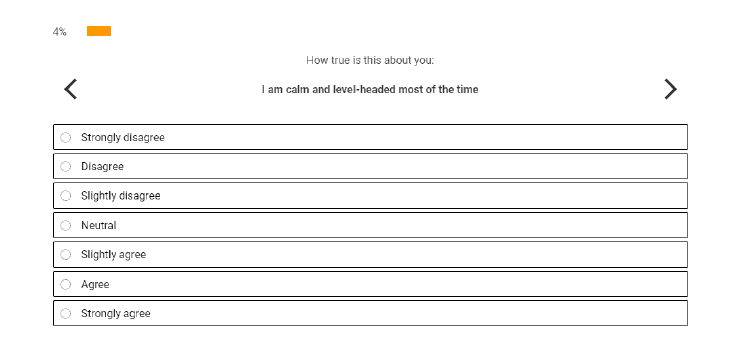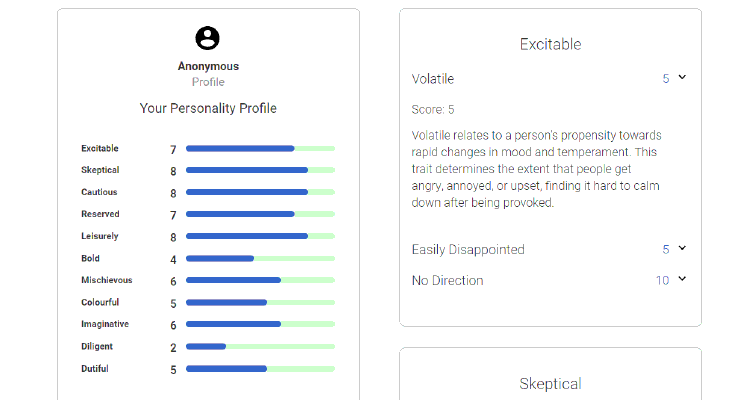Hogan Personality Assessments: Guide to the Personality Inventory (HPI) and Development Survey (HDS)
Prepare for success on the Hogan Personality Assessments. Advice and mock test for candidates.

Page contents:
Jump to:Updated:
Note: AssessmentDay and its products are not affiliated with Hogan. Our practice tests are intended only for candidate preparation, not for employee selection.
About Hogan personality assessments
Understanding human behaviour is crucial in various aspects of life, from personal relationships to professional endeavors. The Hogan Assessment Systems, renowned for their comprehensive and reliable psychometric tools, offer valuable insights into individual personalities and behaviours, helping individuals and organisations make informed decisions and achieve greater success.
Here, we will walk you through the ins and outs of the Hogan Personality Assessment, demystifying its purpose, structure, and significance in your career path. Armed with practical tips and strategies, you'll be empowered to showcase your true potential and present your most authentic self.
There are two personality assessments we will cover: the Hogan Personality Inventory (HPI) and the Hogan Development Survey (HDS).
Hogan Personality Inventory (HPI)
What is the Hogan Personality Inventory?
The Hogan Personality Inventory (HPI) is a widely used psychometric test designed to evaluate an individual's personality traits, behaviours, and potential performance in the workplace. It helps organisations make informed decisions about hiring, development, and team building.
Format of the HPI
The HPI consists of 206 multiple-choice questions. Candidates are asked to select responses that best describe their typical behaviour in various work-related situations. The assessment typically takes around 15 to 20 minutes to complete.
The Hogan Personality Inventory (HPI) presents its questions in a multiple-choice format, where you are given a series of statements and asked to choose the option that best describes your typical behaviour or how you would likely react in various work-related situations. The questions in the HPI are designed to assess your personality traits and behaviour patterns, specifically in the context of the workplace.
The statements in the HPI cover a wide range of work-related scenarios and behaviours. They might ask about your preferences in teamwork, leadership style, problem-solving approach, response to stress, interpersonal interactions, and decision-making processes, among other aspects. For example:
- I enjoy leading and directing others in a team setting
- I tend to be calm and composed in high-pressure situations
- I prefer taking calculated risks when making business decisions
- I am comfortable working independently without much supervision
- I find it easy to adapt to changes in the workplace
Here is an example question from our Hogan Personality Inventory-style personality test:

You will be presented with several options for each statement and asked to choose the one that aligns best with your usual behaviour. The options often range from "Strongly Disagree" to "Strongly Agree" or "Never" to "Always."
How to pass the Hogan Personality Inventory
The HPI is not a pass-or-fail assessment. There are no right or wrong answers. The goal is to provide an accurate representation of your typical behaviours.
To ensure you answer the questions as best as you can and the test makes the most reliable assessment of your personality you can follow these steps:
- Be Honest and True to Yourself: Provide responses that genuinely reflect your typical behaviour in work-related situations. Don't try to guess what the "ideal" response might be.
- Avoid Extreme Responses: Try not to select extreme answers unless they genuinely represent your typical behaviour. Instead, opt for responses that reflect the middle ground, as they often provide a more accurate portrayal of your personality.
- Keep the Workplace Context in Mind: Remember that the HPI is focused on work-related behaviours. So, think about how you would naturally respond in a professional setting.
- Respond Consistently: The HPI includes redundant items to ensure the consistency of your responses. Answering consistently reinforces the accuracy of your results.
- Don't Overthink: Responding quickly and trusting your instincts generally leads to more accurate results. Avoid overanalyzing or spending too much time on each question.
We have a version of the Hogan Personality Inventory (and the Hogan Development Survey) in our personality pack, so that you can take it and see what your results would be.
Did You Know?
Hogan Assessments are based on the Five Factor Model (also known as the Big Five), which includes personality dimensions like Openness, Conscientiousness, Extraversion, Agreeableness, and Emotional Stability (Neuroticism).
Start practising quality tests with a free account
Practice makes perfect
- Learn from detailed solutions
- Track your progress

Hogan Development Survey (HDS)
Understanding the HDS is crucial for candidates as it provides insight into potential areas of concern that may affect their performance in the workplace.
What is the Hogan Development Survey?
The Hogan Development Survey (HDS) is a personality assessment designed to identify potential career derailers and problematic behaviours that may emerge in high-stress or leadership situations. Unlike the Hogan Personality Inventory (HPI), which measures typical behaviour, the HDS focuses on potential "bad" behaviours.
Format of the HDS
The HDS typically consists of 154 multiple-choice questions, and candidates are asked to respond based on how well each statement describes their behaviour when they are under stress or facing challenging situations. The assessment usually takes around 30 to 40 minutes to complete.
The Hogan Development Survey (HDS) presents its questions in a multiple-choice format, where candidates are asked to respond based on how well each statement describes their behaviour when they are under stress or facing challenging situations. The assessment assesses potential behaviours that may emerge in high-pressure scenarios, especially when individuals are in leadership or stressful work environments.
The statements in the HDS cover a range of workplace scenarios and behaviours that could be potentially problematic if they become exaggerated. These behaviours are known as "derailers" and can hinder job performance and negatively impact relationships with colleagues and subordinates. The HDS aims to uncover these derailers to provide a comprehensive understanding of an individual's potential risks in leadership roles.
Examples of statements you might encounter in the HDS include:
- I become impatient and easily frustrated when facing obstacles at work
- I tend to be overly critical of myself and others when things don't go as planned
- I have a strong need to be in control of situations
- I don't like it when people don't try their best
You will have to answer from a scale of "Strongly Agree" to "Strongly Disagree".
How to pass the Hogan Development Survey
Just like the Hogan Personality Inventory, there are no pass-marks as the test is an assessment of your personality. We would recommend you follow the same tips we mentioned above for the HPI when answering the HDS.
However, rather than aiming to "pass" the HDS, candidates should view it as an opportunity for self-awareness and growth. Understanding potential derailers can help you develop strategies to manage stress, improve interpersonal interactions, and enhance your overall leadership effectiveness.
Here is the top of the results page for our Hogan Development Survey-style assessment:

As you can see this candidate has scored highly in skepticism (cynical + grudges), cautiousness and low in diligence. A hiring manager would likely look at this personality profile and not be too enthusiastic about wanting them to join their team. Understanding your potential "derailers" can help you work on these weaknesses or even alter your answers to not appear this way.
Join those now working at top companies
Don't settle for 'try again next year'. Let us help you pass employer tests first time.
Try now for free
Hogan Personality Assessment FAQs
- Are Hogan Personality Assessments only for job candidates?
- Are Hogan Personality Assessments accurate?
- Will the results of Hogan Assessments be shared with me?
- Can I prepare for a Hogan Personality Assessment?
Other test publishers...
There are multiple Hogan alternatives that companies may use, here are some of the most popular: